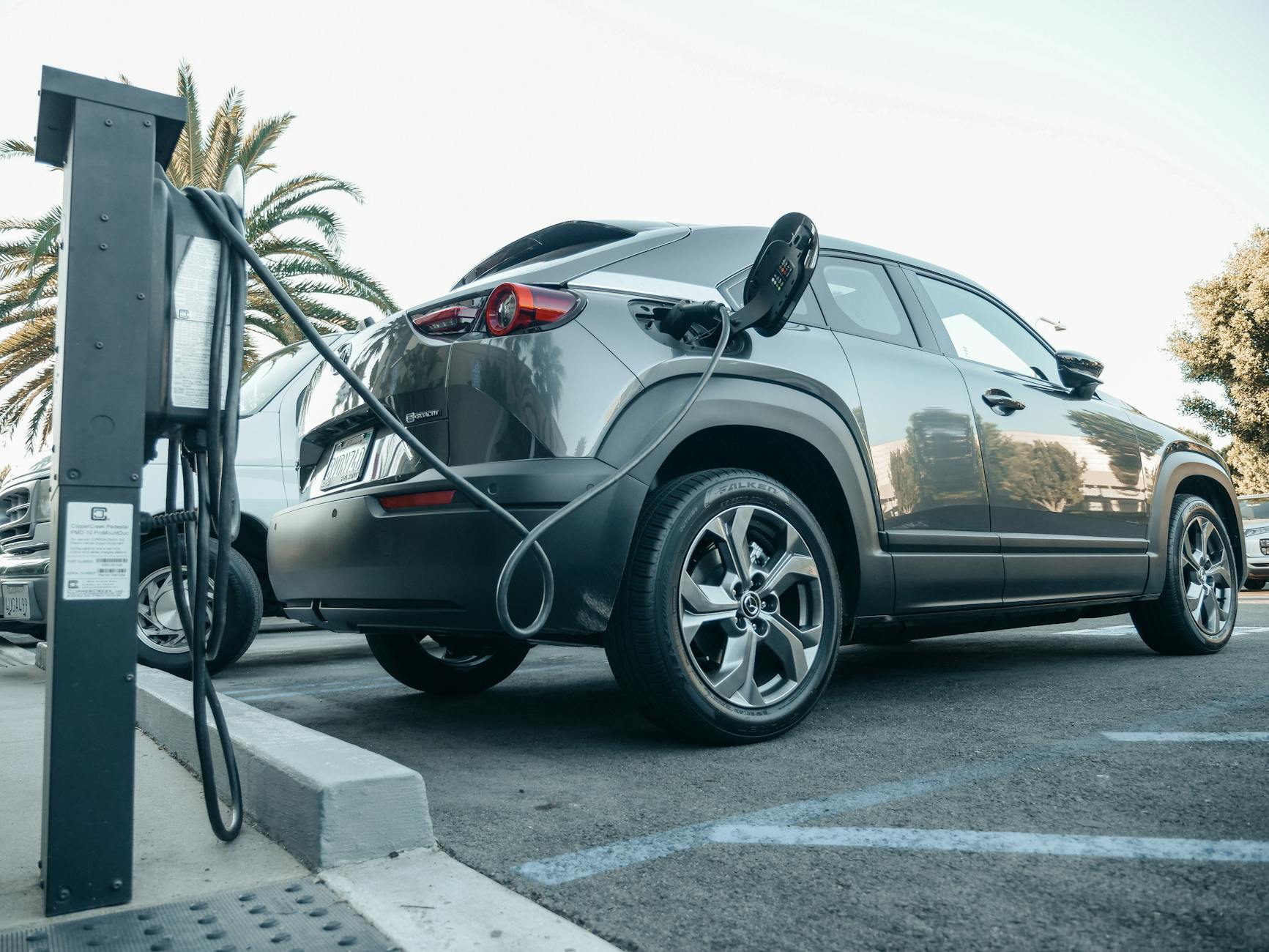
Are you ready to supercharge your EV without breaking the bank? 🚗⚡️ As electric vehicles become increasingly popular, finding an affordable and efficient home charging solution is more crucial than ever. But with so many options flooding the market, how do you choose the right one?best budget-friendly EV chargers for home use.
Imagine coming home after a long day, plugging in your EV, and waking up to a fully charged battery without worrying about sky-high electricity bills. In 2025, this dream is becoming a reality for budget-conscious EV owners. From smart features to weatherproof designs, the latest budget-friendly EV chargers are revolutionizing home charging. But which ones offer the best value for your hard-earned money?
In this comprehensive guide, we’ll dive into the world of affordable EV chargers, exploring top picks like the wallet-friendly Emporia EV Charger and the versatile ChargePoint Home Flex. We’ll break down the essential features to consider, uncover specialized options for unique needs, and reveal how these budget-friendly choices can lead to significant long-term savings. So, buckle up and get ready to discover the perfect EV charger that won’t leave your finances running on empty! 🔌💰
Understanding EV Charger Basics – Best Budget-friendly EV Chargers for Home
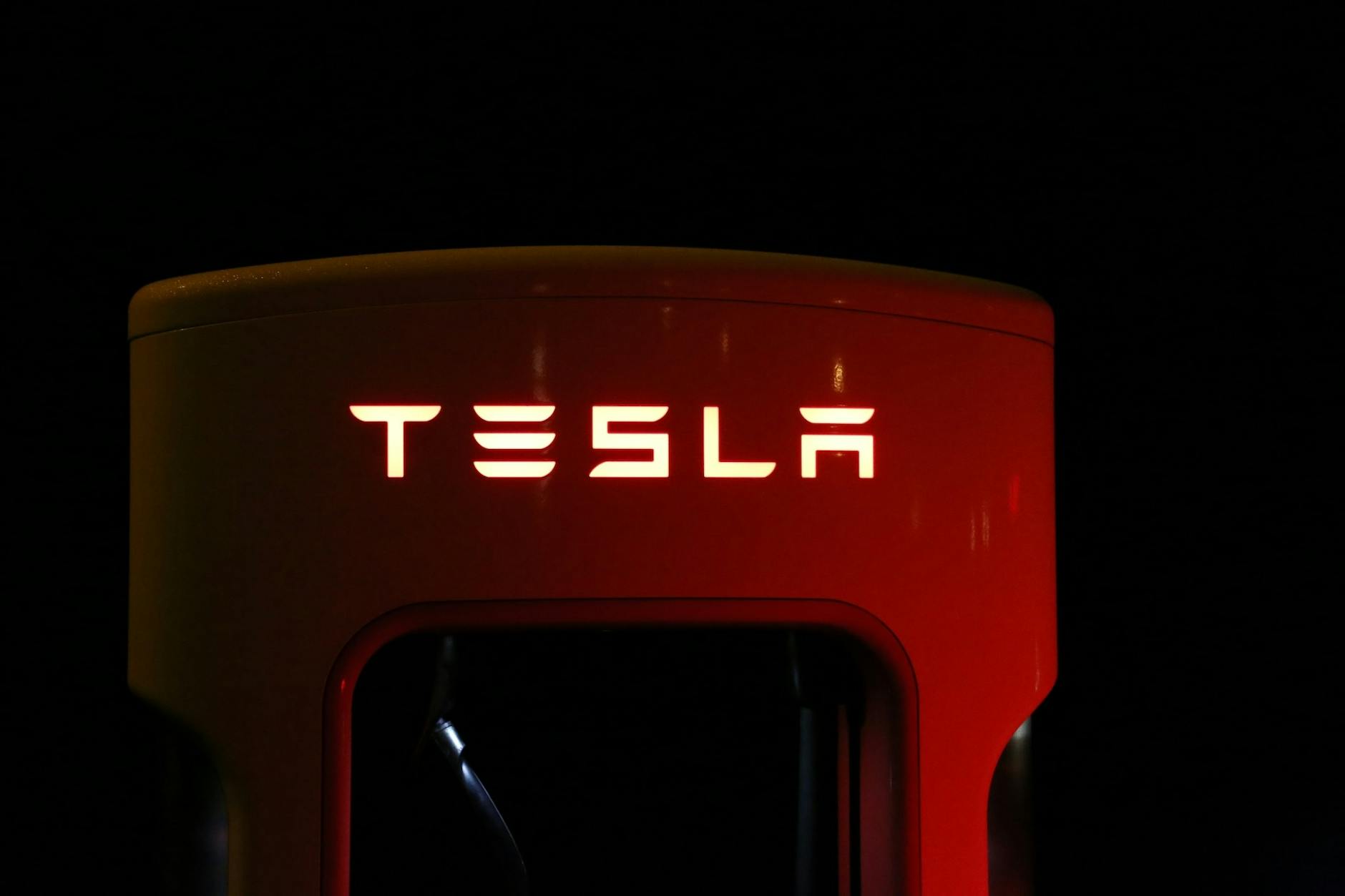
A. Types of EV charging levels – Best Budget-friendly EV Chargers for Home
Electric Vehicle (EV) charging is categorized into three main levels, each offering different charging speeds and capabilities:
- Level 1 Charging
- Utilizes standard 120-volt household outlets
- Provides up to 5 miles of range per hour
- Ideal for overnight charging, especially for plug-in hybrid vehicles
- No special installation required
- Level 2 Charging
- Uses 240-volt outlets, similar to those for large appliances
- Offers an average of 25 miles of range per hour
- Suitable for home use and commonly found in public charging stations
- Requires installation by a qualified electrician
- Can fully charge most EVs overnight (8-10 hours)
- Level 3 Charging (DC Fast Charging)
- Utilizes high-voltage direct current (DC)
- Delivers up to 250 miles of range per hour
- Can charge an EV to 80% in 20-30 minutes
- Ideal for long-distance travel and quick top-ups
- Typically found at public charging stations
B. Key technical aspects: output power and connector types – best budget-friendly EV chargers for home use
When choosing an EV charger, it’s crucial to understand two key technical aspects:
- Output Power
- Measured in kilowatts (kW)
- Determines charging speed
- Higher output power results in faster charging
- Connector Types
- J1772: Standard connector for non-Tesla EVs (Level 2 charging)
- Tesla’s NACS: Proprietary connector for Tesla vehicles
- CHAdeMO: Used by some Asian manufacturers (e.g., Nissan, Mitsubishi)
| Connector Type | Compatible Vehicles | Charging Level |
|---|---|---|
| J1772 | Most non-Tesla EVs | Level 2 |
| Tesla NACS | Tesla vehicles | Level 2 & 3 |
| CHAdeMO | Some Asian EVs | Level 3 |
It’s worth noting that Tesla vehicles can use adapters for J1772 and CHAdeMO connectors, providing flexibility in charging options.
C. Importance of home electrical assessment
Before installing a home EV charger, it’s crucial to assess your home’s electrical capacity:
- Circuit Capacity: Ensure your home’s electrical system can handle the additional load of an EV charger.
- Electrical Upgrades: Some homes may require electrical upgrades to support Level 2 charging, which can significantly impact installation costs.
- Professional Consultation: It’s highly recommended to consult a certified electrician for:
- Assessing your home’s electrical capacity
- Determining the need for any upgrades
- Ensuring safe and proper installation of the charging unit
- Charger Configuration: Consider whether a hardwired or plug-in unit is more suitable for your home setup.
- Outdoor Rating: If installing the charger outside, ensure it’s rated for outdoor use to withstand various weather conditions.
By understanding these EV charger basics, you’ll be better equipped to choose the right charging solution for your needs. With this knowledge in mind, we’ll next explore the “Top Budget-Friendly EV Chargers for 2025,” where we’ll apply these concepts to help you find the best affordable options for home use.
Top Budget-Friendly EV Chargers for 2025
Now that we’ve covered the basics of EV chargers, let’s explore some of the top budget-friendly options available for home use in 2025. These chargers offer a balance of affordability, performance, and features that make them ideal for cost-conscious EV owners.
1. Emporia Level 2 EV Charger: Fast and compact
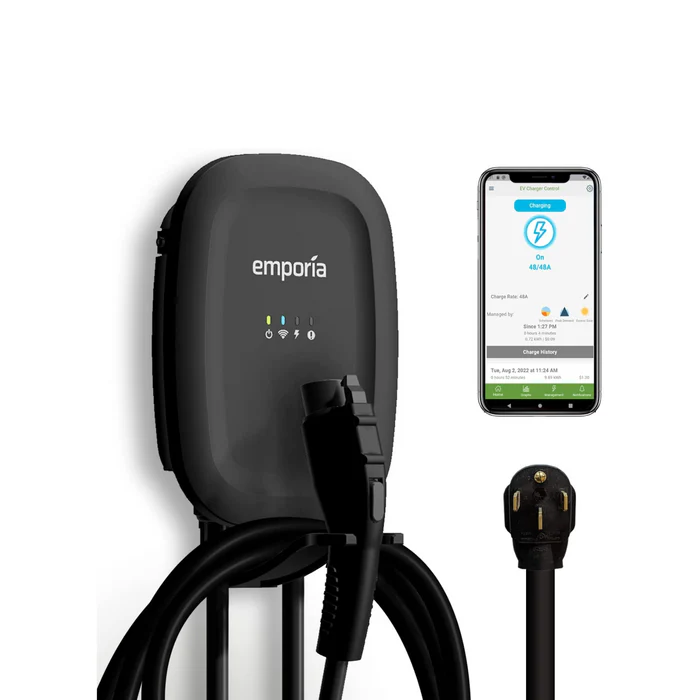
The Emporia Level 2 EV Charger stands out as a top choice for budget-conscious consumers looking for a fast and compact charging solution. Priced at $399, it offers excellent value for money without compromising on performance.
Key features:
- Output: Up to 48 amps
- Charging speed: Adds 20-35 miles of range per hour
- Smart home integration
- Weatherproof design for outdoor installation
The Emporia charger’s compact design makes it suitable for various installation locations, while its smart home integration allows for easy scheduling and monitoring of charging sessions. Its affordability and performance make it an excellent choice for those seeking a balance between cost and functionality.
2. United Chargers Grizzl-E Classic 40A: Cost-effective power
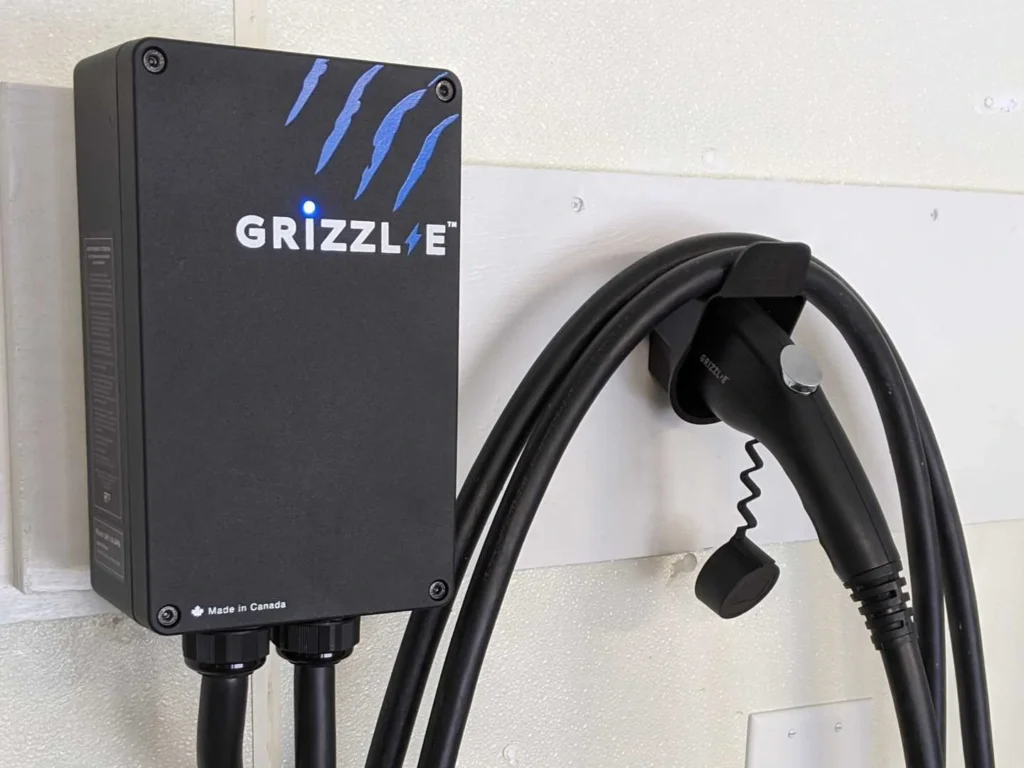
The Grizzl-E Classic 40A from United Chargers is another budget-friendly option that doesn’t skimp on power. Known for its rugged build and affordability, this charger is perfect for those who need a durable solution without breaking the bank.
| Feature | Specification |
|---|---|
| Output | 40 amps |
| Build | Rugged, weatherproof |
| Installation | Hardwired or plug-in options |
| Smart features | Limited |
While the Grizzl-E Classic may lack some of the smart features found in more expensive models, its robust construction and reliable performance make it an excellent choice for budget-conscious EV owners who prioritize durability over advanced functionality.
3. Lectron Portable Level 2 Chargers: Affordable portability
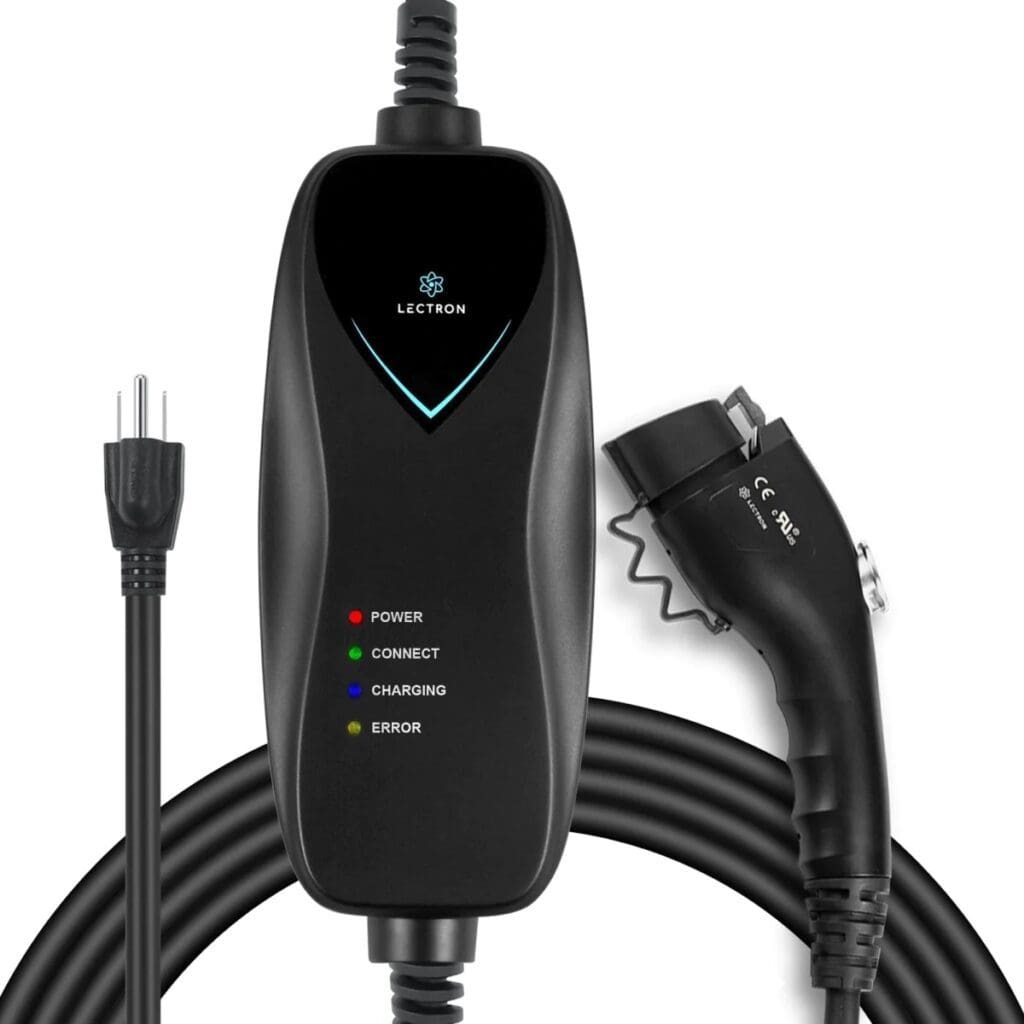
For those who need flexibility in their charging setup, Lectron’s Portable Level 2 Chargers offer an affordable solution that doesn’t compromise on performance. These chargers are ideal for EV owners who may need to charge at different locations or want a portable backup option.
Benefits of Lectron Portable Chargers:
- Affordability
- Portability
- Versatility for different charging locations
- Compatibility with various EV models
The Lectron V-Box Pro, in particular, stands out for its simplicity and ease of use. While it may not offer advanced features like Wi-Fi connectivity or smartphone app control, it provides reliable charging performance at a budget-friendly price point.
When considering these budget-friendly options, it’s important to remember that installation costs can vary significantly based on your home’s electrical capacity. Consulting with a certified electrician is crucial to ensure proper installation and potential upgrades if needed.
Additionally, these chargers offer different levels of weatherproofing, so consider your installation location when making your choice. For outdoor installations, ensure you select a charger with appropriate weatherproof ratings to withstand the elements.
It’s worth noting that while these budget-friendly options may not have all the advanced features of more expensive models, they still provide reliable and efficient charging for most EV owners’ needs. The key is to balance your budget with your specific charging requirements and home setup.
With these budget-friendly EV chargers in mind, next, we’ll explore the essential features to consider when choosing an EV charger. This will help you make an informed decision based on your specific needs and ensure you get the best value for your investment.
Features to Consider When Choosing an EV Charger – Best Budget-friendly EV Chargers for Home

Now that we’ve explored the top budget-friendly EV chargers for 2025, let’s delve into the crucial features you should consider when choosing an EV charger for your home. These features will help you make an informed decision that balances cost-effectiveness with functionality.
Charging Speed and Amperage Options
When selecting an EV charger, charging speed is a paramount consideration. The charging speed is directly related to the amperage of the charger and your home’s electrical capacity. Here’s a breakdown of common circuit ratings and their corresponding charging capabilities:
| Circuit Rating | Charger Amperage | Range Added per Hour |
|---|---|---|
| 20A | 16A | 12 miles (19 km) |
| 30A | 24A | 18 miles (29 km) |
| 40A | 32A | 25 miles (40 km) |
| 50A | 40A | 30 miles (48 km) |
| 60A | 48A | 36 miles (58 km) |
| 70A/80A | 50A | 37 miles (60 km) |
It’s essential to assess your daily driving needs and choose a charger that can replenish your EV’s battery overnight. For most home users, a Level 2 charger operating at 240 volts provides an ideal balance between charging speed and cost-effectiveness.
Smart Functionalities and App Integration
Many modern EV chargers come equipped with smart features that enhance user experience and energy management. Key smart functionalities to look for include:
- Remote monitoring and control
- Scheduling capabilities for off-peak charging
- Energy usage tracking and cost estimation
- Integration with home energy management systems
Wi-Fi connectivity is crucial for accessing these smart features. Some chargers, like the ChargePoint Home Flex, offer comprehensive app integration, allowing you to monitor charging sessions and track energy consumption from your smartphone.
Weatherproofing and Durability – Best Budget-friendly EV Chargers for Home
For outdoor installations, weatherproofing is a critical feature. Look for chargers with high NEMA ratings that can withstand various environmental conditions. Key aspects to consider are:
- Water resistance
- UV protection
- Operating temperature range
- Overall build quality
Outdoor-rated chargers ensure safe and reliable operation regardless of weather conditions, protecting your investment in the long run.
Installation Requirements: Hardwired vs. Plug-in
EV chargers come in two main installation types:
- Hardwired: These chargers are directly connected to your home’s electrical system.
- Pros: Potentially higher charging speeds, permanent installation
- Cons: Requires professional installation, less flexibility
- Plug-in: These chargers plug into a compatible 240V outlet.
- Pros: Easier installation, portability
- Cons: May have lower maximum amperage, requires a nearby outlet
When choosing between hardwired and plug-in options, consider:
- Your home’s existing electrical infrastructure
- Local building codes and regulations
- Future-proofing needs (e.g., potential for higher charging speeds)
- Installation costs, including potential electrical upgrades
It’s highly recommended to consult a certified electrician to assess your home’s electrical capacity and determine the most suitable installation method for your chosen EV charger.
With these features in mind, we’ll next explore specialized EV charger options that cater to specific needs and preferences, helping you find the perfect charging solution for your electric vehicle.
Specialized EV Charger Options – Best Budget-friendly EV Chargers for Home

Now that we’ve explored the essential features to consider when choosing an EV charger, let’s delve into some specialized options that cater to specific needs and future-proofing your home charging setup.
Dual EV Charging Solutions
For households with multiple electric vehicles, dual EV charging solutions offer convenience and efficiency. These systems allow for charging two EVs simultaneously, maximizing your home’s charging capabilities. Companies like EV Charge Solutions® provide a range of dual charging options that can be customized to fit various power levels and connector types.
Key benefits of dual EV charging solutions include:
- Reduced installation costs compared to installing two separate chargers
- Efficient use of available electrical capacity
- Simplified management of multiple vehicle charging schedules
| Feature | Benefit |
|---|---|
| Load balancing | Optimizes power distribution between two vehicles |
| Smart scheduling | Allows prioritization of charging based on vehicle needs |
| Space-saving design | Compact installation for garages or parking areas |
Tesla-specific Chargers and Universal Compatibility
While Tesla has its proprietary charging system, many EV charger manufacturers now offer universal compatibility options. ChargePoint, for instance, provides a platform that supports both ChargePoint stations and OCPP-compliant hardware, ensuring a consistent charging experience across various EV brands.
For Tesla owners considering future-proofing their home charging setup:
- Look for chargers with adaptable connectors
- Consider universal charging stations with Tesla adapters
- Explore ChargePoint’s network for compatibility with Tesla vehicles
Future-proofing with NACS Support
The North American Charging Standard (NACS) is gaining traction in the EV industry, with major automakers adopting this standard for future models. To ensure your home charging solution remains relevant, consider chargers that support or can be upgraded to support NACS.
EVgo, a leader in public fast charging networks, is actively expanding its infrastructure to include NACS support. This trend is likely to influence home charging solutions as well. When selecting a home EV charger, look for:
- Upgradeable firmware to accommodate new charging standards
- Modular designs that allow for easy connector swaps
- Manufacturers committed to supporting emerging charging technologies
By choosing a charger with NACS support or upgrade potential, you can:
- Extend the lifespan of your charging equipment
- Ensure compatibility with a wider range of future EV models
- Potentially increase the resale value of your home charging setup
As we transition to discussing cost considerations and savings in the next section, it’s important to note that while specialized charging options may have a higher upfront cost, they can offer long-term value through increased flexibility and future-proofing. Companies like EverCharge are leveraging advanced technologies such as SmartPower to maximize charging efficiency and reduce overall costs, demonstrating that investing in specialized solutions can lead to significant savings over time.
Cost Considerations and Savings – Best Budget-friendly EV Chargers for Home
Now that we’ve explored specialized EV charger options, let’s delve into the crucial aspect of cost considerations and potential savings when choosing a budget-friendly EV charger for home use in 2025.
A. Price ranges for different charger types
When considering budget-friendly EV chargers, it’s essential to understand the price ranges for various types. While specific prices aren’t mentioned in the reference content, we can infer that there are different categories of chargers with varying costs. Here’s a general overview:
| Charger Type | Features | Relative Cost |
|---|---|---|
| Basic Level 1 | Slow charging, comes with most EVs | Low |
| Standard Level 2 | Faster charging, common for home use | Medium |
| Advanced Level 2 | Smart features, faster charging | Higher |
| DC Fast Chargers | Rapid charging, less common for home use | Highest |
B. Installation costs and professional assessment
The installation of an EV charger is a significant factor in the overall cost. Here are key points to consider:
- Professional assessment is crucial to determine the suitability of your home’s electrical system.
- Installation costs can vary widely depending on your home’s existing infrastructure.
- The total installation cost includes both the charger and the labor for installation.
It’s important to note that the Inflation Reduction Act (IRA) provides a federal tax credit that can help offset these costs:
- Covers 30% of the total installation cost, up to $1,000
- Available to residents of rural or low-income areas (as determined by census tracts)
- Eligibility can be checked using the 30C Tax Credit Eligibility Locator
C. Tax incentives and potential utility programs
Several incentives and programs can significantly reduce the cost of installing a budget-friendly EV charger:
- Federal Tax Credit:
- 30% of costs, up to $1,000 for homeowners
- Available through December 31, 2032
- Claim using IRS Form 8911
- Non-refundable credit (cannot result in cash back)
- State and Local Incentives:
- Vary widely by location
- Can be explored through the Database of State Incentives for Renewable Energy (DSIRE)
- Enter your zip code to find applicable incentives
- Utility Company Programs:
- Rebates for EV charger installations
- Demand-response programs that compensate for managed charging during peak periods
- Contact your local utility representative for specific offers
- Additional Savings:
- Some areas offer combined incentives for EV chargers and residential solar installations
- Solar installation tax credit of up to 30% for eligible expenses until December 2032
It’s worth noting that while these incentives can significantly reduce costs, recent political changes may affect some clean energy incentives. However, private sector initiatives, such as the collaboration between major automakers to develop a private EV charging network, continue to support the growth of EV infrastructure.
With these cost considerations and potential savings in mind, the next crucial step is ensuring compatibility and safety when selecting and installing your budget-friendly EV charger. We’ll explore these aspects in the following section to help you make an informed decision for your home charging setup.
Ensuring Compatibility and Safety

Now that we’ve covered the cost considerations and potential savings associated with budget-friendly EV chargers, let’s delve into the crucial aspects of ensuring compatibility and safety when choosing and installing your home EV charging solution.
Checking vehicle connector types
When selecting an EV charger for your home, it’s essential to verify that it’s compatible with your vehicle’s connector type. In the U.S. market, there are several common connector types:
- Combined Charging System Type 1 (CCS1): This is the most widely used connector for EVs and PHEVs in the United States.
- Tesla Connector: Tesla vehicles use a proprietary connector, distinct from other EV brands.
- J1772: Used by some EVs and PHEVs, often in combination with other connector types.
- CHAdeMO: Found on some older EV models, though it’s being phased out.
To ensure compatibility, consider the following:
| Connector Type | Common Vehicle Brands | Charging Levels |
|---|---|---|
| CCS1 | Most non-Tesla EVs | Level 1, 2, 3 |
| Tesla | Tesla | Level 1, 2, 3 |
| J1772 | Various brands | Level 1, 2 |
| CHAdeMO | Older Nissan, Mitsubishi | Level 3 |
It’s crucial to check your vehicle’s manual or consult with the manufacturer to confirm the exact connector type required for your EV.
Safety certifications and ratings
When it comes to EV chargers, safety should be a top priority. Look for chargers that have been certified by recognized safety organizations and comply with industry standards. Key safety considerations include:
- Dedicated circuits: Ensure your home’s electrical system can handle the high power demands of EV charging.
- Overcurrent protection: Look for chargers with built-in safeguards against electrical overloads.
- Weatherproofing: If installing outdoors, choose a charger rated for outdoor use to withstand various weather conditions.
- Grounding: Proper grounding is essential to prevent electric shocks and ensure safe operation.
When selecting an EV charger, look for the following safety certifications:
- UL (Underwriters Laboratories) certification
- ETL (Intertek) certification
- CSA (Canadian Standards Association) certification
These certifications indicate that the charger has undergone rigorous testing and meets established safety standards.
Adapters for cross-compatibility between EV models
While most North American electric vehicles use standardized connectors, there may be instances where you need to charge an EV with a different connector type. In such cases, adapters can be a solution for cross-compatibility. However, it’s important to note that:
- Not all adapters are created equal: Only use adapters specifically designed for EV charging and certified for safety.
- Charging speed may be affected: Using an adapter might result in slower charging rates compared to using a native connector.
- Tesla’s new standard: Tesla has introduced a new standard (NACS) to simplify the charging experience, which may impact future adapter needs.
When considering adapters, keep in mind:
- Compatibility with both your vehicle and the charging station
- Safety ratings and certifications
- Potential impact on charging speed and efficiency
It’s generally recommended to use a charger that natively supports your vehicle’s connector type for optimal performance and safety. However, adapters can be useful for occasional charging needs or when traveling.
By carefully considering these factors – connector types, safety certifications, and potential adapter needs – you can ensure that your chosen EV charger is not only budget-friendly but also compatible and safe for your specific electric vehicle model. Remember, when in doubt, consult with a qualified EV charging installer or your vehicle manufacturer for personalized advice on the best charging solution for your needs.
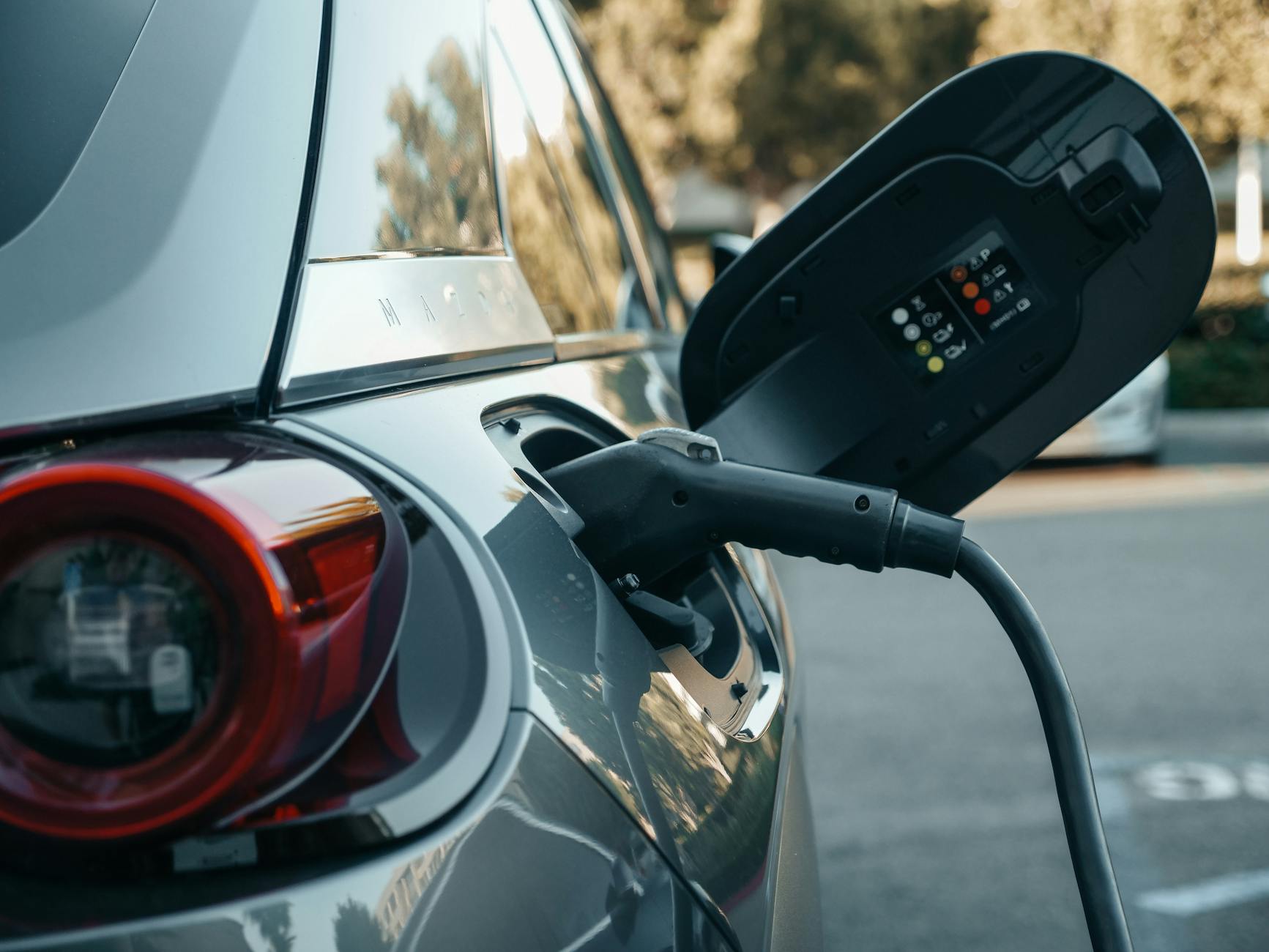
As we’ve explored the world of budget-friendly EV chargers for home use in 2025, it’s clear that there are numerous options to suit various needs and preferences. From understanding the basics of EV charging to examining top picks like the ChargePoint Home Flex and Emporia EV Charger, we’ve covered essential features, cost considerations, and compatibility issues. The importance of selecting the right charger for your specific requirements cannot be overstated, as it directly impacts your charging experience and long-term satisfaction.
When choosing an EV charger, remember to consider factors such as charging speed, smart features, durability, and installation requirements. Don’t forget to assess your home’s electrical capacity and consult with a certified electrician if needed. With the available tax incentives and the potential for long-term savings, investing in a quality home EV charger is not just a convenience but a smart financial decision for the future of your electric vehicle ownership.
Here you can find the top EV chargers for home

Pingback: Level 1 vs Level 2 EV Chargers: Key Differences - Electrodrive